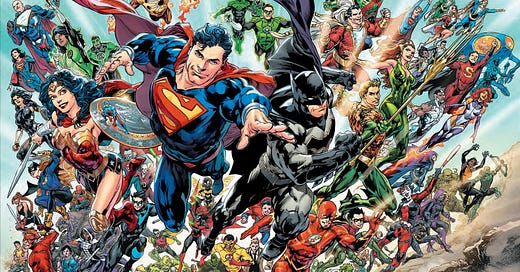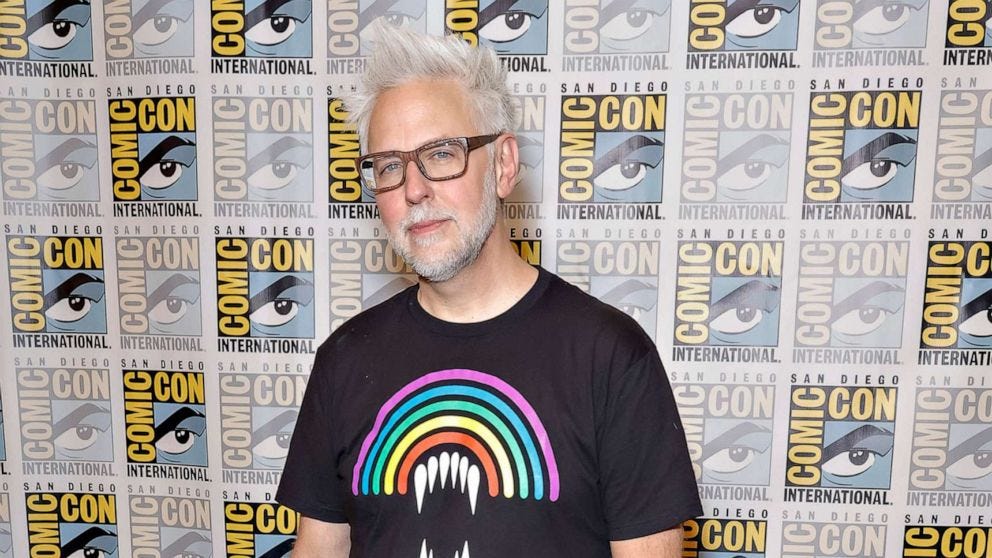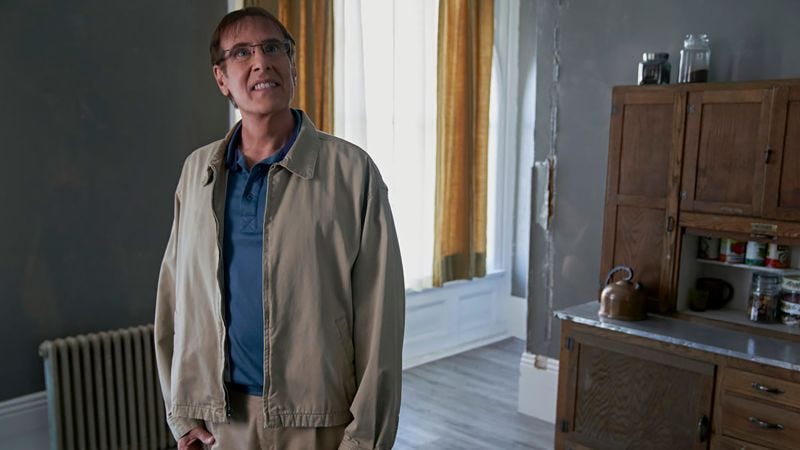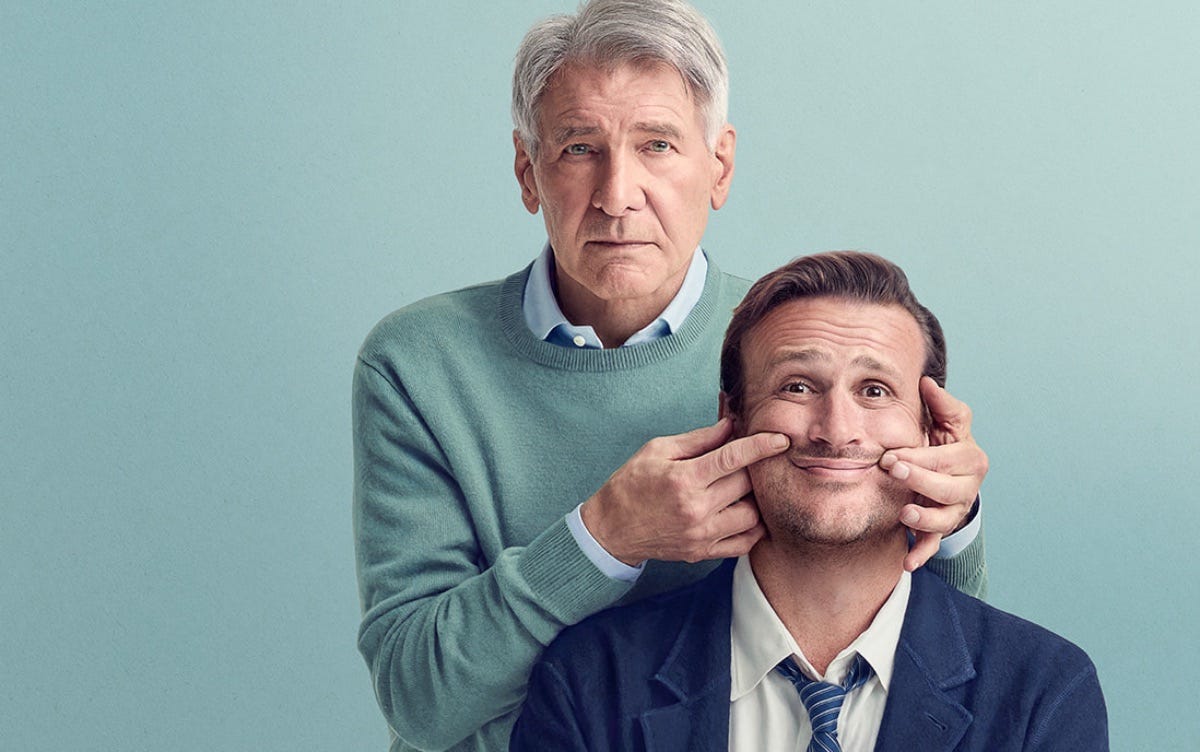First off, if you missed the posts from earlier this week, I’d encourage you to go back and check out the We’re Watching Here episode about Robert Altman’s The Player and – perhaps more importantly – read about my 10 favorite movies of 2022.
Although I had some posts about movies I anticipated in the new year and a retrospective of Matt Reeves’ Cloverfield, it feels like the bulk of my January was focused on finishing up 2022. And we’re not completely over last year yet; there are a few Oscar nominees I need to catch up on. But posting my top 10 list feels like it gives me permission to stop focusing solely on last year and start enjoying some new releases and other stuff I’ve missed out on. We’re going to talk a lot about TV in this week’s newsletter, and I’ll link to my review of the new M. Night Shyamalan movie.
But first, let’s talk about how James Gunn just broke the DC Universe (and maybe not in a bad way).
The messy new DCU
New DC studio head James Gunn and his co-CEO Peter Safran made big movie news this week when they finally unveiled much of their plan for the next few years of DC movies. I’m not going to reiterate every single announcement here; you can find them online. But there’s a lot in the works, with a new Superman movie, a new Batman adventure (with Robin!), a Green Lantern TV series in the mold of True Detective, the return of Swamp Thing to the big screen, and a series about Booster Gold, a character I know absolutely nothing about.
The announcement is actually a huge swing for Gunn and Safran, who are seeking to tie the disparate parts of the DC universe together in a series of TV shows, movies and videogames that operate cohesively…except when they don’t.
I’ll be honest: there’s a chance this could be more of a mess than DC is currently in, juggling stories with clashing tones while several different iterations of the same characters bounce around in other projects. The new Batman won’t be played by Robert Pattinson or take place in Matt Reeves’ vision of Gotham City…but Reeves will still direct Pattinson in The Batman 2, as part of what’s been called the Batman Crime Saga. There will be a new, younger Superman in a movie called Superman: Legacy, written by Gunn … but Ta-Nehisi Coates is still re-imagining the character for his own take. The new Superman will be a figure of kindness, but Gunn’s also pumped about The Authority, a big, R-rated superhero melee that has more in common with his version of Suicide Squad (which, apparently is still in play). Henry Cavill is still out of a job, Zachary Levi is still Shazam, Jason Momoa is still Aquaman (until they announce him as Lobo),The Flash is still apparently a thing, and it’s unclear whether Margot Robbie is still playing Harley Quinn, except that she’s most definitely not playing the character in Todd Phillips’ Joker 2, which is still happening with Lady Gaga in the role (and it’s a musical).
No, I have no idea how the hell this is all going to work, either. And that’s kind of why it’s so exciting.
Marvel’s multiplatform storytelling was revolutionary, and it’s part of what’s made the MCU the most popular franchise in Hollywood. There’s no surprise that Warner Brothers wants its own MCU, and has been clumsily chasing it ever since The Avengers defeated The Dark Knight Rises at the box office, tilting the balance of power in superhero cinema.
But DC’s attempts to tell one big story have been shaky at best and, to be honest, its biggest success have come when it diverges from a common narrative thread and shared universe and just goes weird. The Batman was the best superhero movie of 2022. Gunn’s Peacemaker series was even better – and while it spun out of a DC movie (that itself reset a previous DC movie), it brought a level of irreverence that the core movies lack. Birds of Prey is beautifully weird, and I think Shazam is one of the better family entries of the last few years. I might hate Joker, but I appreciate that it’s something different than we typically get.
And I trust Gunn. I think he has both a love for these characters and a willingness to make unsafe choices. Guardians of the Galaxy is the best franchise in the MCU because it’s totally bonkers and irreverent, yet it has an engaging emotional core. Maybe the clash of sincerity, edginess, horror and animation will collapse; but maybe attempting to create one big universe full of all these conflicting tones and characters – with the Elseworld stories like Joker 2 and The Batman 2 creating their own unique corners of this world – will capture the diversity and vibrancy of the best of comic books.
It sounds risky and weird, and there’s a good chance I could hate it all. But at the same time, it’s the boldest approach I’ve seen from DC yet, and that’s better than just trying the same old thing.
Alright, let’s talk TV…
What to make of PAUL T. GOLDMAN?
I heard several film and TV fans I trust talking about Peacock’s Paul T. Goldman over the last few weeks, and it made me curious enough to check in. I ended up bingeing through all six episodes last weekend.
If my discussions with friends and coworkers is any indication, most people aren’t aware of the show. I’ll tread lightly, because I highly encourage you to go watch this, with the caveat that unless you’re ready for a strange and often uncomfortable ride, it might not be for you.
The true-crime/comedy/docudrama has been a passion project for director Jason Woliner (Borat 2) for about a decade. The series tells the story of Paul T. Goldman, a Florida man who claims to have discovered that his wife was part of a global prostitution ring. Goldman wrote and self-published a novel called Duplicity based on his true-life adventures, and he’s also written a screenplay. He contacted Woliner over Twitter about making his dreams a reality. The series brings his story to life.
Sort of.
Paul T. Goldman is a mixture of true crime documentary and cringe comedy. Yes, it tells the story of how Goldman discovered that his wife was not who she presented herself as (whether she’s as Paul presents her is a key question in the series). It follows his investigation and ropes in the various lawyers, private investigators and ::checks notes:: psychics who assisted him. But it intersperses that with filmed sequences from Goldman’s script, in which he stars alongside professional actors like Dee Wallace, Frank Grillo and Dennis Haysbert. Woliner shoots these sequences with the polish of a TV thriller, but it’s quickly obvious Goldman is not a natural actor, and part of the humor comes from his awkward line delivery, tendency to smile while filming dramatic scenes, and the overly chummy behavior he tries to form with his colleagues. Goldman’s just as awkward in the straightforward interview scenes, overly chatty and wildly enthusiastic.
In the first few episodes, I found myself laughing but also uncomfortable because the show seemed to be a joke at Goldman’s expense, using his tale of woe to poke fun at a man who often comes across like a real-life Michael Scott. And while I don’t think that totally goes away, as Paul T. Goldman continues, I think it transforms into something a bit deeper, more compelling and, at times, troubling.
The best comparison I can give to this show is Nathan Fielder’s The Rehearsal (Woliner has worked with Fielder in the past), which made the line between fact and fiction liquid and seemed to get its greatest joy in making audiences squirm. But I think Woliner is a little more compassionate than Fielder and more willing to interrogate his own motives. As the story develops and we learn that the roles of everyone involved are not so clear-cut, it becomes a fascinating look at chasing fame, loneliness, delusion and resilience. Its final episode goes to some deeply strange places. It doesn’t wrap things up neatly but does allow the series to more deeply probe into its main character and his investigation, arriving at a place that doesn’t necessarily feel like closure but does feel like progress.
It’s a hard show to talk about with those who haven’t seen it, mainly because part of its appeal is the way it keeps transforming into something new from episode to episode (similar to The Rehearsal). But for those who liked Fielder’s reality-bending HBO series, I think Paul T. Goldman is worth checking out. It’s funny and weird, and at times deeply uncomfortable, but it’s not empty calories; there’s something on its mind.
POKER FACE and SHRINKING
I’m two episodes through Peacock’s Poker Face and Apple TV +’s Shrinking. And while I don’t think two episodes is enough for me to offer a final judgment on them, I wanted to share my first impressions. Both are shows I enjoy – with slight hesitations on one and more considerable ones on the other – and that I plan to keep following this season.
Poker Face was created by Rian Johnson, whose Glass Onion just missed my 2022 top 10 list. Natasha Lyonne stars as Charlie, a woman with a natural ability to tell if a person’s lying just by staring at their face and the bad luck to wind up in towns around the same time murders happen. On the run from a Vegas baddie (Benjamin Bratt) who wants her dead, she travels across the country solving crimes like a modern Columbo.
Poker Face is a bit of a throwback to the days when TV didn’t need every episode to build off another. The first episode sets up why Charlie is on the road, but every subsequent episode is a contained mystery; we see the murder committed in the first 20 minutes, and we know who did it – the fun isn’t in figuring out the culprit but in watching Charlie put the pieces together, just waiting for the moment the murderer will slip up with a lie and Charlie will utter her trademark “bullshit.”
The episodic structure is both its strength and its slight weakness. I’ll admit it’s refreshing to turn on an episode and not have to worry about what plot threads I still remember; I can see the show turning into comfort food. But the structure also puts it at risk for feeling repetitive, and while I didn’t find the second episode bad at all, I was growing impatient as it went through its opening paces and I waited for Lyonne to show up.
That might be something the show has to reconcile with in time. But honestly, the writing is so solid, the structure so clever and Lyonne so good that once the episode kicked into high gear, I didn’t care. The format allows the show to bring in guest stars when it desires – the pilot is fantastic, with a great villain turn from Adrien Brody. And Charlie is such an engaging, likable and curious character – Lyonne is flat-out great – that it’s fun to watch her meet new people, build friendships and then play amateur detective. I can see how the energy might flag without the right guest stars or strong writing, but as long as Lyonne continues to be a solid centerpiece, I plan on sticking with Poker Face.
I’m a little more cautious, but still optimistic, about Shrinking, the new Apple TV+ sitcom from Scrubs and Ted Lasso co-creator Bill Lawrence and Roy Kent himself, Brett Goldstein. There’s a lot to enjoy in its first two episodes, but the show is also a bit of a tonal mess.
That might be by design, as Shrinking focuses on Jimmy (Jason Segel), a psychiatrist who’s more troubled than his patients. He’s grieving the death of his wife and trying to raise their daughter, and he’s on the verge of a breakdown. One day, he snaps and begins telling his patients what he really thinks and pushing them to make drastic changes – much to the chagrin of his colleagues, played by Jessica Williams and Harrison Ford. But in true sitcom fashion, Jimmy’s drastic measures seem to work, and renew his vigor in his profession.
Few showrunners are better at mixing silliness and sincerity than Lawrence; Scrubs could make me belly laugh just seconds before making me burst into tears. Shrinking aims for the same thing, but the heavy stuff is sometimes too heavy (particularly in the pilot) and the light stuff not outlandish enough for it to really hit. And for a 30-minute show, Shrinking is trying to do a lot. It’s a hangout comedy between Jimmy and his coworkers and patients, it has to reconcile with Jimmy’s grief and rebuilding of the bridges he’s burned, and it’s a show about a father learning to reconnect with his daughter, who’s running from him and finding more comfort with their neighbor (Christa Miller). It’s a lot, and makes the first two episodes a bit shapeless and overstuffed.
But when Shrinking just focuses on the characters, it shows a lot of promise, and my hope is it become less plot-y and more hangout-y as it goes along (the second episode feels more relaxed and light). I like Jimmy’s friendship with a patient who has rage issues. Jessica Williams is a lively and funny addition to anything. And Harrison Ford is so identified with playing iconic heroes that it’s easy to forget that he’s also got a great dry humor and sense of comic timing (I don’t know why people forget this, as Han Solo and Indiana Jones are both very funny characters). He’s really good here, and gets some of the show’s funniest lines.
And really, this is just another reminder of how much I enjoy watching Jason Segel. He’s a funny actor with a knack for portraying sadness and vulnerability, often milking humor from those very things. From Freaks and Geeks to How I Met Your Mother, he’s been a highlight of some of my favorite shows, and I’ve enjoyed much of his film career (the fact that he played a key role in resurrecting the Muppets is a big win, too). He’s really good here, playing a raw nerve who can vacillate between grief and live-wire energy, and I think he navigates the messy tone quite well, even if the script falters.
Sitcoms often need a bit of time to find their footing and let their casts gel. I’m hopeful Shrinking and its cast hit a stride in the next few episodes. Whatever the mess, it’s a highly enjoyable cast to watch.
In Review
I wanted to get around to a book report this week, but this newsletter is already running long. So, we’ll save that for another day. But one book I was going to mention was Paul Tremblay’s The Cabin at the End of the World, which I read over the holiday break and really enjoyed. It’s a tense, bleak and unsettling horror novel that left me a bit shaken. And this week, its film adaptation, Knock at the Cabin, hits theaters. Directed by M. Night Shyamalan, it’s a fairly suspenseful piece of work, one that I think might be his strongest since Split. Think Frailty by way of The Strangers, although I don’t think it’s quite as strong as either of those, and it suffers from an ending that makes concrete what should have been left ambiguous. But it’s worth a watch. Read my review at CinemaNerdz.
That’s it for now! We’ll be back next week!








